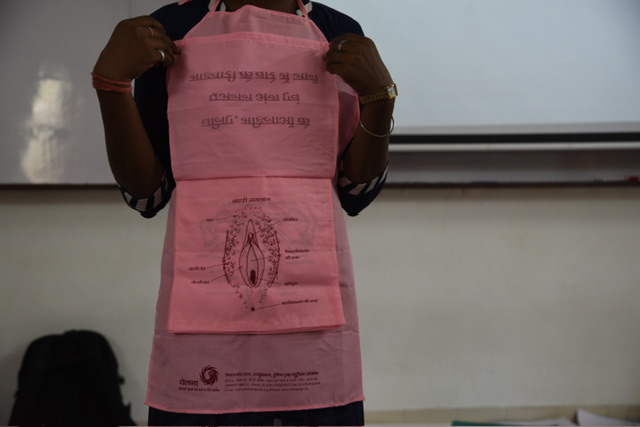“I was hesitant to talk to elders in my village as I was insecure about my experiences and societal status. Girl Icon Program gave me the confidence to put forth my opinion with confidence.”- Varsha Soni
A 20-year-old Girl Icon, Varsha hails from the village of Raahat in the district of Harda in Madhya Pradesh.
In Varsha’s village, girls face restrictions when it comes to their freedom. They are barred from stepping out of their houses for work and to fetch things they required. Varsha, however, had the soul of a free bird. She dreams of girls being able to move freely as independent individuals. From a young age, she could understand that these restrictions imposed on girls are not justified and she should do something to change this – as a young rebel, she started her revolution by stepping out of her house alone.
“Sometimes people used to complain to my father. They would say that allowing a girl to step out of the house was a mistake and this freedom of movement should only apply to boys,” says Varsha. However, such opinions did not matter to her father and he stood by her choices. “I am glad my parents stood by me and supported my independence.” With this strong support from her parents, she formed her peer group of girls to work on the issue of sanitation and hygiene for adolescent girls.
The inaccessibility of toilets in rural areas is a pervasive problem. The bus stop in Varsha’s village was devoid of toilets. The men were seen urinating in public, making the bus stop an unhygienic spot, while the women suffered in silence. “My peer group and I reached out to the Gram Sabha members of my village during village meetings and demanded that there should be public toilets for men and women near the bus stand. Our action resulted in a proposal being drafted.” Varsha and her peer groups’ proposal was taken into consideration by the Gram Sabha members and they reached out to the government. This resulted in the construction of public toilets as per their demand in the vicinity of the bus stand in Raahat village.
Prior to the national Census of 2011, the UPA-II government’s website was claiming that 72% of rural households in India had a toilet. However, the Census 2011 revealed that only 32% had a toilet – which tells us how reliable government data on such target-driven programs is. The government then promptly conducted a survey in 2012 which found that actual toilet coverage was a mere 36% of households.
Varsha was not done yet! After learning about the taboos and misconceptions around menstruation, Varsha decided to work on breaking the myths around the natural phenomenon. “I, along with my peer group members, decided to eradicate the conservative beliefs around menstruation by launching a campaign called ‘No Shame’ in my community.” Varsha came up with innovative ideas for her campaign. This involved gifting sanitary napkins to her friends on their birthdays, openly demonstrating the use of sanitary napkins in public, and bringing together women in her village to discuss menstrual hygiene. They conducted a rally on adolescent health and menstrual hygiene management. Varsha shares, “Girls remain unaware of the concept of using sanitary pads and its disposal. Usage of cloth comes with a lot of hygiene maintenance, which can also increase the risk of infections.”

According to the National Family Health Survey-4 (NFHS), released in 2015-16, not even 50% of women used clean methods of dealing with their menstrual cycles in eight states and union territories. Menstruation is still taboo in India. Even now, women are considered “impure” during their period, and subjected to social, religious and cultural restrictions, according to a study on menstrual health management. These practices have resulted in a culture of silence around the subject of period hygiene – 70% of Indian mothers consider menstruation “dirty”, as per the findings of a study.
Varsha currently is a second-year student of B.Sc. and is also pursuing a Bachelor’s in Social Work. She continues to fight for the rights of girls and women in her village and India, actively using social media to spread her message. This young leader aspires to be a police officer in the future.

